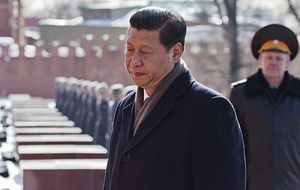Accompanying the news that Zhou Yongkang is finally to be formally tried for a raft of crimes broadly classified as corrupt practices, there were less clear-cut hints suggesting that the vice president himself, Li Yuanchao, is also starting to be engulfed by investigators from the dreaded Central Discipline Inspection Commission (CDIC).
On the surface, the two cases are very different. Zhou, however powerful he once was, is a retired politician. Li is active. While not on the Politburo Standing Committee, as vice president he has a certain status – this, after all, was the position previously occupied by Hu Jintao and then Xi Jinping. And while no one is claiming that Li is in line for succession as head of the Sixth Generation leaders (at 65, he is too old for that), vice president is a prominent position to try to remove someone from — and one from which the target can make a lot of noise.
There is a further dissimilarity. Zhou was publicly widely reviled, as he was associated with heavy handed security clampdowns and deeply linked with one of the core state owned behemoths. He fits the public stereotype of an overly powerful, greedy, and parasitical official. Li, however, seems a more sympathetic character. His name has not come up naturally in lists of the biggest exploiters of political power. On the contrary, he has been viewed as a liberal by experts like Cheng Li of the Brookings Institution in the United States. During his time as Party boss of the wealthy coastal province of Jiangsu from 2002 to 2007, Li supported township elections. He also took time out of his official career in the early 2000s to study briefly at Harvard’s Kennedy School of Government.
For these reasons, allowing the CDIC to unleash their full firepower on Li would in many ways be a significant new turn for the anti-corruption campaign.
It is impossible to say that Li is innocent of all claims of corruption. But in the current party elite, it’s hard to imagine anyone who doesn’t have within his or her network at least some possible linkage to venality and illicit moneymaking, whether knowingly or unknowingly (and it is unlikely the CDIC makes much distinction between the two). It is not a question of being innocent for China’s leaders, because in a sense none of them is. They are all implicated in the Party’s immense moneymaking prowess over the last decade or so simply by virtue of being key officials over this period.
The real question is why one person’s guilt should be highlighted over another’s. With Li, the danger is that the public might not regard an investigation as s clear cut case, they way they looked at the humbling of Zhou. They may well start to view the whole anti-corruption campaign as something very much like a political purge.
This sense of a purge is reinforced by the one network that Li Yuanchao has been most deeply connected to — the China Youth League, where he worked for a number of years from the 1980s onwards. Where hard facts are sparse, this is one of the few tangible things that links Li to someone else who has attracted the interest of the CDIC — Ling Jihua, his current Politburo colleague. Ling, the faithful servant of Hu Jintao during his time in office, also emerged from the Youth League. Is the Youth League, the training ground for party membership and one of the core networks that leaders in the past have cultivated in order to be promoted, being exposed to a disciplinary purge to pull it down to size? Is this the underlying logic behind the as-yet unproven rumors of Li’s imminent exposure?
If Li does get outed, no doubt the CDIC will issue exhaustive “proof” justifying the Party’s actions. But that would be par for the course. The smell of purgatory politics would be hard to remove. People may well start to look at other products of the Youth League stable, chief among them current Premier Li Keqiang, and wonder if they too are at risk. There is already a lot of fear and apprehension amongst officials at all levels in China. If a vice president is taken down, this fear might become endemic, potentially fracturing the elite. And suddenly, Xi’s colleagues might well start see him as someone who place himself above the Party, rather than its most loyal and faithful servant.
The anti-corruption campaign is at a critical stage. The military, provincial, and central figures taken in have largely been ones that lack a ready connection with each other. They look either too greedy or too unlucky — that’s as much as on objective outsider can say about them all. But if Li were to go down, then much harder political issues come to the fore. Suddenly, the figure that connects all the dots is simply Xi Jinping himself.
For this reason, Li’s fall may well be a step too far even for Xi. But if he takes it, then we are truly in uncharted waters, far more so than even after Zhou’s case.

































